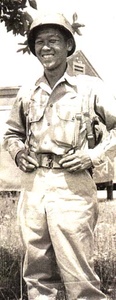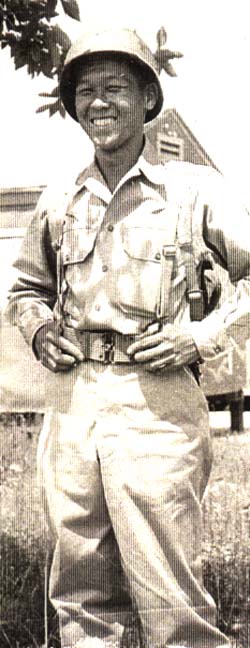
Banco de Dados da Experiência Militar Nipo-Americana

Dr. James Toshiaki Mimura
Sexo
Male
Birth date
1922-01-03
Local de nascimento
Honolulu HI, USA
Inducted
1943-03-25, Honolulu HI
Tipo de alistamento
Volunteer
Ramo das Forças Armadas
Army
Tipo de serviço
War
Tipo de Unidade
Combat
Unidades onde serviu
442nd Regimental Combat Team, Company F, 2nd Battalion
Military specialty
Combat Medic
Infantryman
Stationed
USA: Schofield Barracks, HI; Camp Shelby, MS
Other Countries: Oran, North Africa; Italy; France.
Separated
Fort Devens MA
Unit responsibility
Infantry
Personal responsibility
I was assigned to Fox Company, 2nd Battalion 442nd RCT as a combat medic responsible for aid to the wounded in combat.
Major battles (if served in a war zone)
Anzio, Italy
Rome to Florence, Italy
Southern France (Bruyeres, Biffontaine)
Awards, medals, citations (individual or unit)
Purple Heart for wound incurred in night patrol action at Florence, Italy
Bronze Star was sent by Secretary of the Army, Gordon Gray.
Presidential Unit Citation with 2 clusters
Unit citations issued to Co. F; 2nd Battalion 442nd RCT for action at Belmont, France, Biffontaine, France and entire effort of 442nd RCT
Combat Medic Badge
3 campaign stars - Asiatic-Pacific, United States, European theaters.
Purple Heart.
Living conditions
In combat we slept in our foxholes.
In the summer, we bathed by wading across rivers. Occasionally had mobile hot shower units when we were relieved for 3 days after a campaign of 30+ days.
Fresh clothing was available then and hot meals. In combat, ate K-rations - 5oz. cans of egg and bacon, cheese, meaty potato hash, chocolate bar, 3 crackers, bouillon powder, lemonade powder. All of this was packaged in boxes the size of cracker jack boxes. Boxes were coated with wax.
On the 3 days relief, we caught up on our sleep.
Most vivid memory of military experience
The camaraderie of all. Many wounded soldiers would refuse evacuation because they didn't want to leave their comrades short-handed.
In Bruyeres in November 1944, I cooked a birthday soup with a few dried shrimp that I had received from my sister for my foxhole buddy Yukio Okutsu and he was surprised and greatly appreciative. I used a sterno for heat and cooked in the foxhole with snow and ice water in the foxhole. Yukio received the DSC later.
The most lasting impression of the war was the realization one day in France and in Italy that people may not look alike or speak the same language but their thoughts and emotions are similar. One day overseas, I concluded that people all over the world laugh and cry over the same things. We're all humans.
I was shocked at the second class treatment of the blacks in the South - even elderly black women had to step off the sidewalk to let whites pass.
I was surprised at the complete lack of knowledge about Japanese Americans in many white people. Yukio Okutsu's DSC award was upgraded to the Congressional Medal of Honor in June 2000.
Missed most whilst in the military
Hot showers.
Chinese and Japanese cuisine.
Contact with my family members.
Most important thing, personally, to come from military experience?
I am proud that I volunteered for combat duty to prove that the Niseis were loyal American citizens. I was in a pre-med program at the U. of Hawaii and the Dean of my college tried desperately to have me continue my studies. I told Dean Arthur Keller that I just had to volunteer because I couldn't stand the thought that many Americans felt that Japanese-Americans were disloyal. The deprivations endured in combat made me appreciative of things such as a drink of water which we take for granted. I matured almost overnight.
Additional information
After my medical school and residency training, I decided to open a practice on the mainland in a Caucasian community, rather than return to Hawaii, because I wanted to see if I could succeed in a 'haole' city. In many instances, my being an oriental helped me because I was easier to recognize and be known than another doctor who was Caucasian. I long ago decided that Japanese Americans can assimilate successfully in America. (Enrolled in the U. of Chicago School of Medicine. Practiced in Royal Oak and Birmingham, Michigan. Clinical Asst. Professor at Wayne State Univ. Medical School.) (Regarding military experience - Given the same circumstances, I would do it again.)
Residence: Farmington Hill, MI.
Ear, Nose and Throat surgeon.
Retired in 1989.


